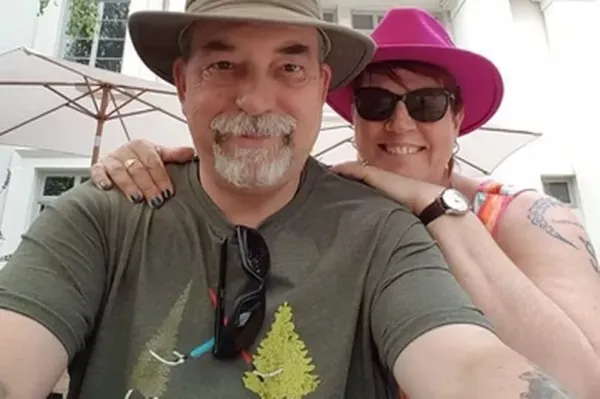
When Ellen Yates first started experiencing dizziness and feeling as if she was "drunk" in 2014, she was originally told she had an ear infection. However, a year later tests revealed she was actuallyliving with a brain tumour.
Now, 10 years later, Ellen has received the devastating news that the mass is growing again. Ellen, from Illogan in west Cornwall, recalled how she was left "sobbing" in the shower after doctors at the Royal Cornwall Hospital identified an acoustic neuroma on her MRI scan.
This "low-grade" mass is located on a nerve that regulates her balance and can cause her entire right side to seize up. At times, Ellen's husband, Kev, has to help her with basic tasks such as using the bathroom or getting out of bed.
READ MORE: Humble corner shop that has been in same family for 117 years - and serves celebrities
READ MORE: Filler addict who spent £3k on Botox unrecognisable after having it dissolved

She first noticed symptoms in December 2014 – experiencing dizziness and feeling as if she was "drunk." "I remember going to bed fine on 29 December 2014, but then waking up the next day feeling strange, almost like I was drunk," the 68-year-old woman said.
"I was staggering across the landing, half of my mouth had drooped, and I could barely stand.
"I thought I was having a stroke. The medics informed me I had an ear infection; I was administered the Epley manoeuvre, where you rotate your head in various movements to eliminate the vertigo.
"This didn't do anything and only ended up giving me sciatica; the whole thing was a complete mess. I had to take sleeping tablets to get through the pain."
By February 2015, Ellen's hearing had deteriorated further, prompting her to return to her GP seeking answers. She said: "In March, I was finally sent for a scan, and it took another month to find out my results.
"I was told I had a low-grade acoustic neuroma. I remember collapsing in the shower, sobbing.
"I had something in my head that should not be there, and I just wanted it out. They didn't want to risk radiotherapy as there was no guarantee it would make anything better and might make it worse."
Although the tumour is classed as benign, and not cancerous, it has continued to have an effect on her life. Ellen said: "It's easy to imagine that low-grade tumours aren't that serious, but it's impacted my life so much in so many different ways.
"At the beginning, I thought benign meant pink and fluffy, but I was very wrong. A benign tumour in your head is not the same as having a benign tumour elsewhere.
"My tumour is on the nerve that controls my balance, so I now fall over easily and have to walk with a stick. My whole right side can seize up. Sometimes, my dear husband, Kev, has to help me on and off the toilet and roll me out of bed.

Throughout the past decade, Ellen also endured a devastating personal tragedy when her dearest friend and "soul sister" Dawn Rogers Parkyn died with a brain tumour in 2021.
Ellen said: "[Dawn and I] met when we were four years old in a convent in Penzance. She was such a big support to me when I was diagnosed, but she never told me or her family when she herself had been diagnosed with glioblastoma.
"We'll never know why she kept it from us. So many people have symptoms of brain tumours and don't know they have one.
"Just one per cent of the national spend on cancer research has been allocated to brain tumours since records began in 2002, I just don't get why.
"Brain tumours and brain cancer seem to be dirty words that get swept under the carpet. I'll stand up and shout about it from the rooftops; more funding is needed if we are to find a cure!".
Now Ellen is taking part in Brain Tumour Research'sWalk of Hope at Torpoint in September, as reported by NeedToKnow. She added: "Having a brain tumour has changed my life, but it's given me a chance to smell the roses in a way.
"I was always running around at 100mph; now I know to appreciate every moment."
SymptomsAccording, to the NHS, symptoms of a brain tumour can include:
Sometimes you may not have any symptoms to begin with, or they may develop very slowly over time.